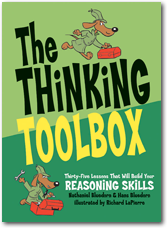Friday, May 27, 2016
The Thinking Toolbox
A side note: These books do have a political and religious bias. It isn't overwhelming. I just see it popping up in the use of particular examples. Examples regarding the existence of God are obviously biased toward faith and belief, rather than atheism (which is fine with us, since we believe in God). This book presents a sample conversation near the beginning that seemed to favor young-earth creationism. One could easily extend the example, though, to discuss responses to the arguments presented. The authors do not take a position, though they do discuss how the creationist was able to make his argument better by planning for the responses of the evolutionist. It's a valuable lesson about looking at your own argument from the opposite perspective. Overall, it's not enough to stop me from recommending this book to others.
Peregrin House

Pages
Followers
What is Peregrin House?
This is our home school. Peregrin comes from the Latin word for "pilgrim," and that is what we are. We are on a journey toward truth and knowledge. It is a creative journey of faith and service, of study and great joy. We hope, also, that our House is a place of rest for other Pilgrims, a place of sanctuary and refreshment for those who travel with us. Peregrin House is both something that we are and something that we aspire to be.
The Servant Song
Will you let me be your servant,
Let me be as Christ to you;
Pray that I might have the grace to
Let you be my servant, too.
We are pilgrims on a journey,
We are travelers on the road;
We are here to help each other
Walk the mile and bear the load.
I will hold the Christ light for you
In the nighttime of your fear;
I will hold my hand out to you,
Speak the peace you long to hear.
I will weep when you are weeping;
When you laugh I'll laugh with you.
I will share your joy and sorrow
'Til we've seen this journey through.
When we sing to God in heaven
We shall find such harmony,
Born of all we've known together
Of Christ's love and agony.
Labels
- A New Coat for Anna (1)
- Albert (1)
- Algebra (1)
- America: The Story of Us (1)
- American Chemical Society (7)
- Android apps (3)
- art and creativity (37)
- Astronomy (3)
- Bible Challenge (1)
- Biology (12)
- Blokus (1)
- Card Games (3)
- Chemistry (7)
- Chess (1)
- Cooking (1)
- Critical Thinking (12)
- Culture and Social Studies (7)
- Dice (3)
- Down Down the Mountain (1)
- Dread Pirate (1)
- Earth Science (9)
- Faces of America (1)
- Fallacy Detective (1)
- Ferdinand (1)
- Five in a Row (42)
- Flat Stanley (1)
- Flinn Scientific (1)
- Fluxx (2)
- Game Schooling (23)
- General Homeschool (11)
- geography (3)
- Geometry (1)
- German (2)
- Germanic American Institute (2)
- Get Outside! (32)
- Gobblet (1)
- Good Books (10)
- Grandfather's Journey (1)
- handwriting (4)
- Harold and the Purple Crayon (2)
- Harry Potter (4)
- Hide and Eek (1)
- history (21)
- Hooked on Phonics (8)
- Iditarod (6)
- Ingebretsen's (1)
- Izzi (1)
- Journal (54)
- language arts (8)
- Language Learning (3)
- Learn That Word (1)
- Logic (14)
- Mad Libs (1)
- Mancala (1)
- math (33)
- Math U See (13)
- Middle School Chemistry (7)
- Minneapolis Institute of Art (2)
- Minnesota Orchestra (1)
- Mirette on the High Wire (1)
- Movies (1)
- Munchkin Quest (1)
- Museum of Russian Art (1)
- Niagara Cave (1)
- Online Learning (7)
- Organization (5)
- Osceola Train (1)
- Owl Moon (1)
- Paul Revere's Ride (2)
- Philosophy (6)
- Physics (2)
- Podcasts (4)
- Prestel Art Game (3)
- puzzles (5)
- Quick Pix (1)
- Quiddler (1)
- Qwirkle (1)
- reading (37)
- Red Wing Trolley (2)
- Reflex Math (2)
- Rum River Art Center (2)
- Rummy Roots (1)
- Saxon Math (1)
- science (49)
- Scrambles States of America (2)
- Sequence (1)
- socialization (11)
- Sonlight (1)
- spelling (1)
- Spelling City (1)
- Stillwater (2)
- Stopping By the Woods on a Snowy Evening (1)
- Story of the World (19)
- Swap (1)
- Swimming (2)
- Symbolic Butterflies (3)
- Tall Ships (1)
- Tapestry Folk Dance Center (1)
- Taylor's Falls (1)
- Technology (4)
- The Gullywasher (2)
- The Science of Smart (1)
- Theology (15)
- Things To Do MN (26)
- Three Names (2)
- Tour De Nature Centers (10)
- Tripoli Rocketry Association (1)
- Walker Art Center (1)
- Wordless Wednesday (1)
- Writing (1)
- Xoom Cubes (1)


0 comments:
Post a Comment